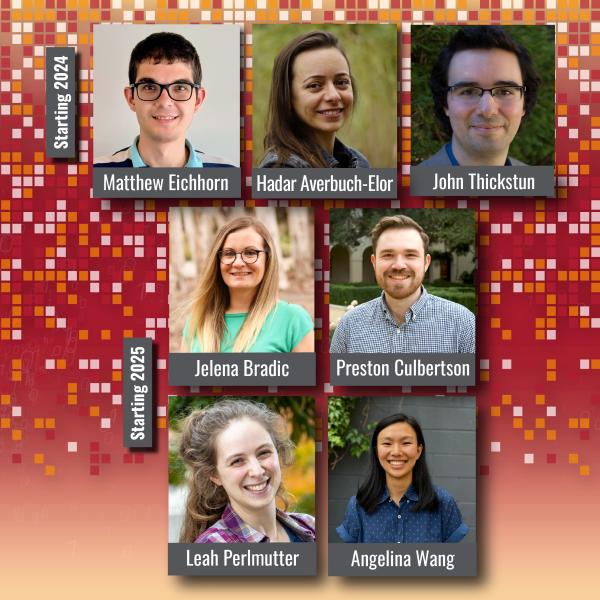August 27, 2024
The Cornell Ann S. Bowers College of Computing and Information Science has bolstered its faculty ranks with the addition of seven new faculty members hired during the 2023-2024 recruiting season.
The new faculty members bring expertise in areas like computer vision, robotics, generative models, causal inference, and fairness in algorithms, among others.
“I am delighted to welcome these exceptional researchers who share in our college’s mission to shape the future of computing and guide the next generation of innovators,” said Kavita Bala, dean of Cornell Bowers CIS. “These faculty are doing exciting work at the forefront of their research areas, and they will broaden and strengthen the college’s expertise in these key fields.”
Three of these faculty members will begin teaching this Fall: Hadar Averbuch-Elor, based at Cornell Tech in New York City, and Matthew Eichhorn and John Thickstun, based at Cornell University’s Ithaca, NY, campus. The remaining four faculty will begin next year. Separately, seven additional faculty hired during last year’s recruiting season will begin this Fall.
The new faculty members help meet growing demand among Cornell students interested in majors offered within Cornell Bowers CIS. The college has committed to expanding its faculty to accommodate the nearly nine-fold increase in undergraduate students – totaling more than 2,000 – who have flocked to Cornell Bowers CIS majors over the last 10 years.
Cornell Bowers CIS is thrilled to welcome the following faculty members:
Jelena Bradic, professor of statistics and data science via the College of Agriculture and Life Sciences (CALS), beginning in 2025. Bradic’s research centers on causal inference, machine learning, and robust statistics, with applications in areas including public health and policy learning.Most recently, Bradic was professor in the Department of Mathematical Sciences and the Halicioglu Data Science Institute at the University of California, San Diego. She received her Ph.D. in operations research and financial engineering, with a specialization in statistics and applied probability, from Princeton University.
Preston Culbertson, assistant professor of computer science, beginning Fall 2025. Culbertson draws on machine learning, computer vision, and control theory to develop robots that move like humans. He is currently a research scientist at The AI Institute in Cambridge, Mass. He received his Ph.D. in mechanical engineering from Stanford University.
Matthew Eichhorn, lecturer in computer science, beginning Fall 2024. Eichhorn’s research explores two areas: the design of online algorithms for combinatorial problems, particularly with applications to game theory, and developing better estimators for causal effects in settings with network interference.He recently received his Ph.D. in applied mathematics from Cornell.
Hadar Averbuch-Elor, assistant professor of computer science at Cornell Tech, beginning Fall 2024. Averbuch-Elor’s research interests lie in the intersection of computer graphics and computer vision, particularly in combining pixels with more structured modalities such as natural language and 3D geometry.She arrives to Cornell Tech from Tel Aviv University, where she was an assistant professor in the School of Electrical Engineering. Prior to Tel Aviv University, she was a postdoctoral research scholar at Cornell Tech, working in the Cornell Graphics and Vision Group. She received her Ph.D. in electrical engineering from Tel Aviv University.
Leah Perlmutter, lecturer in computer science, beginning Fall 2025. Perlmutter is an assistant professor of computer science at Grinnell College. Her research centers on inclusion in computer science. She completed her Ph.D. at the University of Washington, with a dissertation about student sense of belonging in post-secondary computer science. Previously, she worked as a software developer at Amazon and EnergySavvy.
John Thickstun, assistant professor of computer science, beginning Fall 2024. Thickstun’s work centers on machine learning and generative models. Specifically, he’s interested in methods that control models’ behavior, both to aid users in accomplishing tasks and for model providers and policymakers who hope to broadly regular outputs of a model. Before arriving at Cornell, Thickstun was a postdoctoral scholar in the Stanford Artificial Intelligence Laboratory at Stanford University. He received his Ph.D. in computer science and engineering from the University of Washington.
Angelina Wang, assistant professor of information science at Cornell Tech, beginning Fall 2025. Wang studies machine learning fairness and algorithmic bias. She is currently a postdoctoral fellow at Stanford University’s Institute for Human-Centered Artificial Intelligence and the RegLab. Wang received her Ph.D. in computer science from Princeton University.



